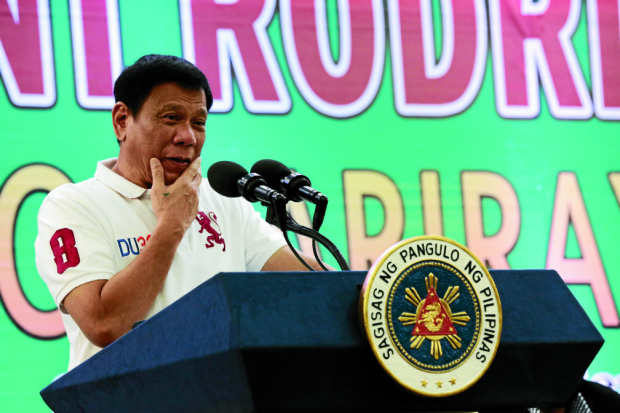A human rights lawyer and party-list congressman on Tuesday said President Rodrigo Duterte may invoke executive privilege to protect the police from being compelled to participate in congressional investigations on the spate of summary killings.
In a press briefing, Kabayan Rep. Harry Roque said the philosophy of executive privilege is to protect the president in his implementation of a policy no matter how unpopular it is with the people.
He said under executive privilege, heads of departments are prohibited from attending congressional investigations without prior authorization from the president.
“The decision behind executive privilege is that the executive must be able to make unpopular decisions. It must never always be publicly accepted if he considers an unpopular decision. He must be given that leeway, that’s the philosophy behind executive privilege,” Roque said.
He made the statement after Solicitor General Jose Calida vowed to protect police from attending congressional investigations into the spate of extrajudicial killings of criminals and the killings of criminals during legitimate police operations.
“I am here to encourage the PNP (Philippine National Police) not to be afraid of any congressional or Senate investigations. We will defend them,” Calida said in a press conference in Camp Crame on Monday.
READ: SolGen Calida vows to protect cops amid spate of drug suspect deaths
The executive privilege was invoked by the administration of then President Gloria Macapagal-Arroyo to stop then Socioeconomic Planning Secretary Romulo Neri from testifying in a Senate investigation into the botched National Broadband Network-ZTE project which involved Arroyo.
Arroyo faces graft charges before the Sandiganbayan for having personal interest in the project and pushing through with it despite knowing irregularities, such as the alleged bribery by then Commission on Elections Chairman Benjamin Abalos on Neri to approve the ZTE proposal.
READ: Arroyo denies graft charges in broadband deal with China firm
According to Arroyo’s executive order 464 issued in 2005, “all heads of departments of the Executive Branch of the government shall secure the consent of the President prior to appearing before either House of Congress.”
Arroyo’s executive order seeks to prevent members of the executive from appearing in congressional investigation on matters concerning the security of the State unless it is done in executive session.
Among those covered in the executive order are senior officials of executive departments; generals and flag officers of the Armed Forces of the Philippines; PNP officers with rank of chief superintendent or higher and such other officers; senior national security officials, among others.
“When the security of the State or the public interest so requires and the President so states in writing, the appearance shall only be conducted in executive session,” the order read.
Roque said the Supreme Court had ruled that the executive had the right to invoke executive privilege to maintain the separation of powers among the executive, legislative and judiciary branches of government.
“Ito’y naging decision ng Korte (It has been the high court’s decision) in case of Neri vs. Senate Blue Ribbon Committee, It continues to be a defense if the executive feels that the matter between Senate and subordinate should not be subject of public discussion,” Roque said.
Senator Leila De Lima and Ifugao Rep. Teddy Baguilat have pushed for the congressional resolutions urging Congress to probe the summary killings of drug pushers and criminals that seem to happen daily since the start of the administration of Duterte, who has supported a bloody war against criminality and drug abuse.
“We have to look into that in aid of legislation. The killings are on the rise, and there are just tell-tale signs of summary executions in a number of them,” said De Lima, a formerly chair of the Commission on Human Rights (CHR).
READ: De Lima calls for inquiry into spate of drug killings
Calida accused De Lima of urging a congressional inquiry not in aid of legislation but for media mileage, turning the tables on De Lima for failing to curb the drug menace in the country during her stint as justice secretary.
For his part, Baguilat has filed House Resolution No. 61 urging Congress to investigate the “spate of extrajudicial killings and/or summary executions of suspected violators of laws on illegal drugs and other suspected criminals.”
READ: Look into extrajudicial killings under Duterte, Congress pressed
Baguilat said since Duterte assumed office on June 30, at least 23 persons suspected of violating laws against illegal drugs were killed by law enforcers “under vague circumstances.”
He added that even before Duterte’s inauguration, at least 68 drug suspects were killed in police operations in the country from January 1 to June 15, and 25 more were killed from June 16 to 20, “demonstrating a shocking increase in police-perpetrated killings.”
On the other hand, the PNP reported 22 suspected drug-related killings outside police operations from May 14 to June 30, Baguilat said.
Baguilat said the spate of summary killings on the hands of the police who were mandated to enforce the rule of law is a violation of the constitutional right of suspected criminals.
BACKSTORY: Duterte vows to continue killing criminals ‘in accordance with law’
“The seemingly unchecked outbreak of extrajudicial killings executed by civil servants trusted by the people to enforce the law indicates a violation of the Constitution…” Baguilat said.
Baguilat also said the extrajudicial killings represent a “deterioration of the rule of law which can lead to people taking the law into their hands,” thereby leading the country towards the path of “lawlessness and anarchy.”
“There is therefore a clamor from the public and government officials alike to look into the disturbing trend of extrajudicial killings of suspected drug criminals,” Baguilat said. RAM
RELATED VIDEOS


